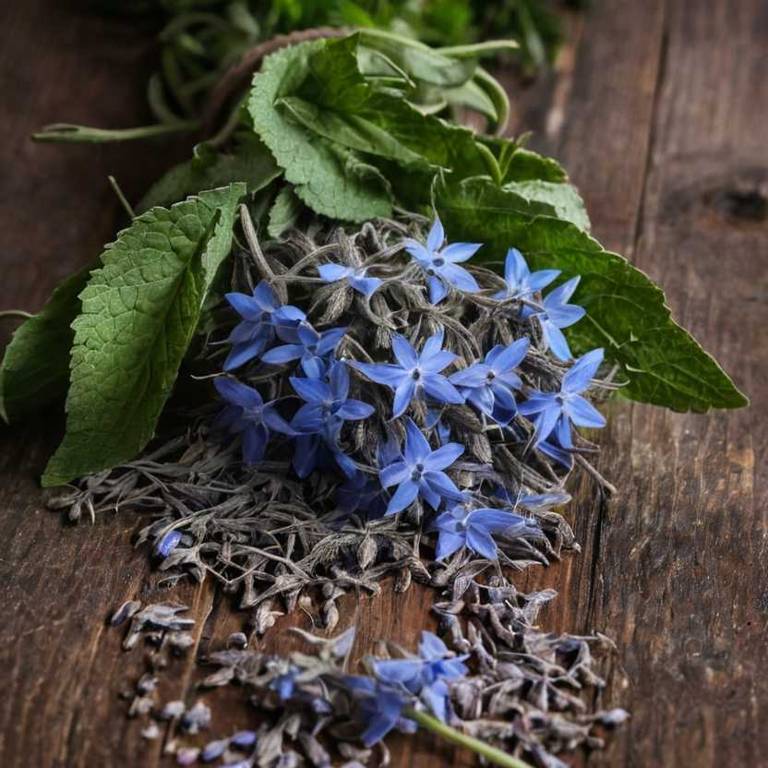Borage (Borago officinalis)
Borage (Borago officinalis) is a member of the Lamiaceae family, native to Europe, North Africa, and West Asia. Traditionally, its leaves, flowers, and seeds have been used for infusions, poultices, and decoctions.
This herb is particularly valued for its anti-inflammatory, diuretic, and antispasmodic actions, and has a long history of use in european herbal medicine, mediterranean herbal traditions, and native american herbal medicine.

Quick Facts / Key Information
| Common Name | Borage |
|---|---|
| Scientific Name | Borago officinalis |
| Plant Family | Lamiaceae |
| Genus | Borago |
| Species | officinalis |
| Native Range | Europe, North Africa, West Asia |
| Plant Parts Used | Leaves, Flowers, Seeds |
| Primary Medicinal Actions | Anti-Inflammatory, Diuretic, Antispasmodic |
| Primary Traditional Systems | European Herbal Medicine, Mediterranean Herbal Traditions, Native American Herbal Medicine |
| Historical Preparation Methods | Infusion, Poultice, Decoction |
Botanical Identity
- Scientific Name
- Borago officinalis
- Common Name
- Borage
- Synonyms / Alternative Names
- Starflower, Blueweed, Woolyweed
- Plant Family
- Lamiaceae
- Genus
- Borago
Botanical Description
- Growth Habit
- Annual herbaceous plant.
- Height
- It typically grows to a height of 30 to 60 centimeters.
- Leaves
- Simple leaves with upper surface glabrous and glaucous, lower surface pubescent and lighter in color, bearing distinct stomatal bands along the midrib.
- Flowers
- Radially symmetrical flowers with five blue-violet petals arranged in a single cluster, each petal bearing a distinct white central vein and a narrow, rounded tip.
- Stems
- Elongated, erect growth habit, opposite branching pattern, glabrous surface, ribbed structure, presence of adventitious root scars.
Traditional Uses / Historical Use
Traditional Systems
- European Herbal Medicine
- Mediterranean Herbal Traditions
Historical Preparation Methods
- Infusion
- Poultice
- Decoction
- Oil Infusion
Medicinal Actions
- Anti-inflammatory
- In herbal texts, considered a cooling anti-inflammatory, for general calming applications.
- Diuretic
- Historically regarded as a soothing diuretic, for elimination-focused applications.
- Antispasmodic
- Commonly referenced as a calming antispasmodic, in smooth muscle contexts.
- Carminative
- Traditionally described as a mild carminative, in stomach-related herbal uses.
Active Compounds
- Essential Oil
- A mixture of naturally occurring compounds responsible for plant aroma.
- Flavonoid
- Naturally occurring polyphenols that contribute to pigmentation and structural chemistry.
- Phenolic Acid
- Naturally occurring phenolic compounds present in many plant species.
- Coumarin
- A class of aromatic organic compounds found in many plant species.
Modern Research Overview
Scientific literature concerning this plant spans multiple areas, including phytochemistry and laboratory research. Detailed analysis of published studies is not included at this time and will be added as part of future editorial expansion.
Safety & Contraindications
- General Precautions
- General precautions have been noted regarding the use of this herb.
- Contraindications
- Reports outlining specific contraindications for this herb are limited.
- Allergies
- There is insufficient evidence to determine whether this herb commonly causes allergic reactions.
- Drug Interactions
- The potential for interactions with prescription medications has not been extensively studied.
- Toxicity
- Available information regarding the toxicity of this herb is limited.
- Pregnancy & Breastfeeding
- Use during pregnancy or breastfeeding has not been clearly established in available sources.
Preparation & Usage Methods
- Infusion
- Water is poured over plant material and allowed to steep before straining.
- Decoction
- A preparation method involving prolonged boiling of roots, bark, or dense plant material.
- Poultice
- Plant parts are crushed or moistened and placed directly on the body.
- Infused Oil
- Oil infusions capture plant compounds using lipid-based solvents.
- Extract
- This method isolates plant compounds using alternative solvents.
Growing, Harvesting & Storage
Growing / Cultivation
- Soil
- Prefers loamy soil with well-drained conditions. Typically grows best in organically rich soils.
- Sunlight
- Thrives in full sun. Tolerates full sun to partial shade.
- Watering
- Prefers well-balanced moisture levels. Tolerates periodic dry conditions.
Medical Disclaimer
The information provided on this page is for educational and informational purposes only. It is not intended to diagnose, treat, cure, or prevent any medical condition. Always consult a qualified healthcare professional before using any herb for medicinal purposes.